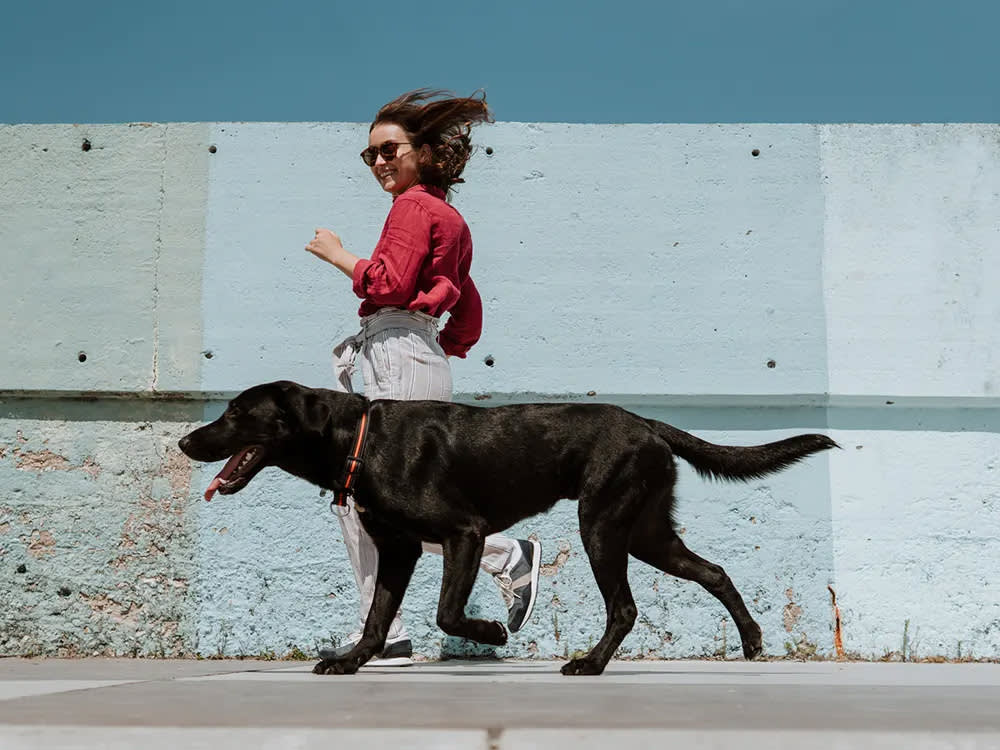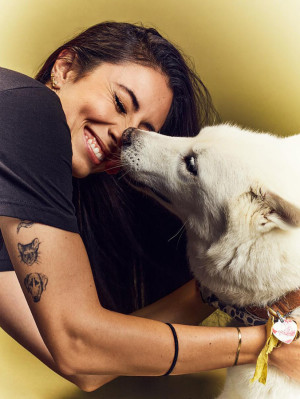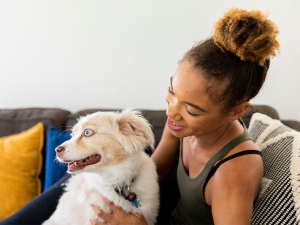A New Drug Could Make Your Dog Live Longer
LOY-002 is a drug aimed at improving your pet’s quality of life—and helping them live longer.

share article
If you watched the Emmys this year, you may have caught Lee Sung Jin, the creator of Netflix’s Beef, giving a shout-out toopens in a new tab “the canine anti-aging pill,” while accepting an Emmy. He was referring to Loyal, the increasingly buzzy biotech start-up that’s currently answering every dog parent’s prayers by opens in a new tab aimed at improving your pet’s quality of life, and possibly even helping them live longer.
Jin’s dream is now closer to coming true, with the San Francisco-based company just announcing some promising news. They’ve started clinical trials for LOY-002, a beef-flavored pill designed to lengthen the lives of senior dogs of nearly all sizes.
In November of last year, The Wildest reported on LOY-001opens in a new tab, a long-acting injectable created to bolster longevity in large adult dogs that the Food and Drug Administration (FDA) deemed to have a “reasonable expectation of effectiveness.” But today, it was announced that by early 2025 (before LOY-001 even hits the market), pet parents will have access to LOY-002, a drug that can be used on a much wider swath of dog sizes.
To facilitate this unprecedented clinical trial, the company is partnering with 50-some vet clinics across the country for what it is calling the STAY study. The company claims more than 1,200 veterinarians have “expressed interest” in participating in STAY, which will include 1,000-plus dogs, each studied for up to four years. If you have a pooch who’s 10 or older and more than 14 pounds, you may be able to enroll them in STAY by contacting a study site near youopens in a new tab for a screening.
The first participant, however, is an adorable 11-year old Whippet named Boo, who’s a big fan of opens in a new tab. “[The drug] could help other dogs, including my younger dogs someday. It’s very important,” says Boo’s mom, Pennsylvania-based Deb Hanna. Boo received his dose of LOY-002 under the watchful eye of Dr. Coby Rudakewiz, STAY’s principal investigator.
“This was an easy decision,” Dr. Rudakewiz said in a statement. “We are constantly looking for ways we can improve the way we care for pets and their health. The more avenues and tools we have to offer and educate owners on how to keep their dogs healthy, the more lives we can affect in a positive way.”
Loyal hopes to take advantage of the FDA’s conditional-approval process through its Center for Veterinary Medicine. This would allow vets to prescribe LOY-002 to qualifying dogs in early 2025, while Loyal continues to accrue the data required for full FDA approval. Additionally, Loyal plans to amass a biobank of saliva and blood samples from dogs in its study, to support future canine (and human!) longevity research.
“There are more than 15 million senior dogs in the United States — including my much-loved senior Rottweiler, Della,” Loyal CEO Celine Halioua said in a statement. “The launch of this study brings us one step closer to helping senior dogs have more, healthier years with their families.”

Nisha Gopalan
Nisha Gopalan has been a writer/editor for The New York Times, New York magazine, Entertainment Weekly, Variety, The Hollywood Reporter, and NYLON magazines. She currently resides in Los Angeles.
Related articles
![Cute girl and huge black great dane face to face in front of window at morning time.]() opens in a new tab
opens in a new tabA New Drug Aims to Extend the Life Expectancy of Large Dogs
The FDA determined it has a “reasonable expectation of effectiveness.”
![woman with red hair holds senior Pomeranian dog]() opens in a new tab
opens in a new tabHow to Take Care of a Senior Dog
As dogs age, it’s important to recognize both physical and mental changes they may be experiencing.
![cat and dog laying on bed together]() opens in a new tab
opens in a new tabWhat’s the Deal with Pet Insurance?
It covers your pet so you can get that broken leg fixed — while keeping your wallet happy.
![woman smiling looking at small Australian Shepard]() opens in a new tab
opens in a new tabWhat Is a Pet Wellness Plan, Really?
It sounds great, but here’s how it actually works.
![French bulldog puppy looking scared at vet]() opens in a new tab
opens in a new tab10 Things to Ask at Your First Vet Visit
There are no stupid questions — well, when it comes to your dog’s health.
![Young female pet parent consulting with African-American male veterinarian while holding her Doxin dog in her lap]() opens in a new tab
opens in a new tabPet Check-Up: 10 Tips for a Better Vet Visit
Become an advocate for your pet during their vet check-ups.






